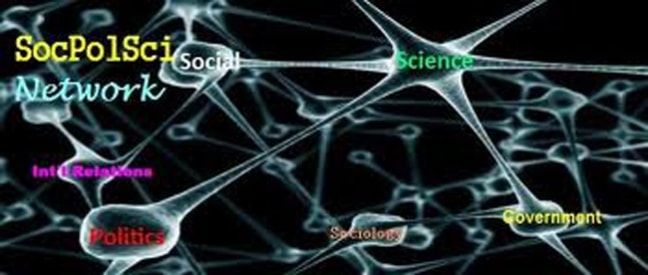
Jaringan SocPolsci Indonesia 2012
Kajian ilmu-ilmu sosial dan ilmu politik di negara-negara maju telah dilakukan berabad-abad yang lalu. Perkembangannya semakin pesat setelah PD II, terutama sekitar proses dekolonisasi. Beasiswa-beasiswapun ditawarkan kepada mahasiswa-mahasiswa di negara-negara berkembang, termasuk Indonesia, yang ingin belajar atau melanjutkan studi di negara mereka (developed countries) di bidang ilmu-ilmu sosial dan ilmu politik
Namun, beberapa negara industri maju yang sangat mengandalkan teknologi tinggi, seperti Jepang dan Jerman, dalam memberikan beasiswa ke Indonesia, dahulu hanya menawarkan beasiswa dalam kelompok ilmu-ilmu alam. Rasionalitasnya jelas, yakni ingin membantu negara-negara berkembang seperti Indonesia dalam pengembangan industri nasional. Namun mereka juga sadar bahwa peran ilmu sosial sangat signifikan dalam menunjang perkembangan industri, kebijakan-kebijakan industri, atau masalah-masalah industrialisasi. Dalam satu dekade terakhir, terjadi pergeseran kebijakan, yakni beasiswa dalam ilmu sosial dan politik juga ditawarkan. Ini secara tak langsung menempatkan ilmu-ilmu sosial dan politik sebagai bidang ilmu penting dalam pengembangan industri sekaligus mengatasi problema-problema industri, industrialisasi, dan masyarakat industri. Hal ini tentunya menjadi angin segar bagi lembaga-lembaga yang memfokuskan diri pada pengembangan ilmu sosial dan ilmu politik serta dalam upaya mencetak SDM handal pada bidang-bidang ilmu terkait.
Di Indonesia, ilmu-ilmu sosial dan ilmu politik berkembang cukup pesat. Hal ini bisa dilihat dari semakin banyaknya universitas yang membuka program-program studi baru di bidang ilmu sosial dan ilmu politik dalam satu dekade terakhir, tanpa menyembunyikan kenyataan bahwa beberapa program studi tertentu juga ditutup.
Pada tahun 2012, Fakultas Ilmu Sosial dan Ilmu Politik memiliki 11 program studi, program pendidikan, atau bidang/program konsentrasi. Kesebelas program studi ini -- sebut saja demikian untuk memudahkan pendeskripsian -- berada di tiga jenjang, yakni program Diploma III, S1, dan S2. Pada program Diploma III, hanya ada Administrasi Perkantoran. Di Program S1 ada Ilmu Administrasi Negara, Ilmu Pemerintahan, Ilmu Sosiatri, Ilmu Hubungan Internasional, Ilmu Komunikasi, Administrasi Niaga/Bisnis, Psikologi, Sosiologi, dan Pemerintahan Integratif (terapan). Sementara pada Program Pascasarjana, ada Administrasi Negara. Sebelas program studi itu bisa diciutkan menjadi sepuluh karena program S1 Administrasi Negara dan S2 Administrasi Negara bidang ilmu atau namanya sama.
Kesepuluh bidang ilmu yang dikembangkan di Fakultas Ilmu Sosial dan Ilmu Politik Universitas Mulawarman juga ada atau dikembangkan di 40 universitas/institut negeri lainnya yang ada di Indonesia. Ilmu Politik dimasukkan karena kedekatannya dengan Ilmu Pemerintahan dan Ilmu Hubungan Internasional. Selain itu, bidang ilmu sejenis yang merupakan bidang ilmu untuk kebutuhan tenaga pendidik (guru) yang diajarkan di perguruan tinggi (dulu namanya IKIP) juga dimasukkan. Dengan kriteria ini, di Indonesia ada 132 program studi lain yang mengembangkan bidang ilmu yang sama dengan yang ada di Fisip Unmul, sehingga kalau ditambah dengan 10 program studi di Fisip akan menjadi 142 program studi. Bila ditambah dengan universitas-universitas swasta di negeri ini, tentu jumlah perguruan tinggi yang mengajarkan atau mengembangkan ilmu-ilmu dimaksud akan bisa bertambah sekitar dua kali lipat mengingat lebih banyaknya jumlah perguruan tinggi swasta.
Tabel di bawah ini merinci 142 program studi tersebut yang ada di 40 universitas. Perlu dicatat bahwa bidang ilmu yang ada di dalam tabel dimaksud adalah bidang ilmu yang diujikan secara nasional dalam Seleksi Nasional Penerimaan Mahasiswa Baru/SNMPTN 2012 (pertimbangan ketersediaan data). Jadi tidak termasuk program studi yang hanya diujikan secara lokal/mandiri dalam Seleksi Mandiri Masuk Perguruan Tinggi Negeri (SMMPTN), kecuali yang ada di Fisip Unmul, Fisip Untan, dan IPDN (lihat katerangan tabel).
Adapun nama-nama universitas dan bidang ilmunya dalam jaringan ilmu sosial dan ilmu politik di Indonesia (SocPolSci Network -- Social and Political Sciences Network) adalah sebagai berikut.
|
NO. |
UNIVERSITAS |
KOTA |
JUMLAH |
PROGRAM STUDI |
|
1. |
UNIVERSITAS SYIAH KUALA |
Banda Aceh |
4 |
Psikologi |
|
Ilmu Politik |
||||
|
Sosiologi |
||||
|
Ilmu Komunikasi |
||||
|
2. |
UNIVERSITAS MALIKUSSALEH |
Banda Aceh |
4 |
Ilmu Administrasi Negara |
|
Sosiologi |
||||
|
Ilmu Politik |
||||
|
Ilmu Komunikasi |
||||
|
3. |
UNIVERSITAS SUMATERA UTARA |
Medan |
6 |
Sosiologi |
|
Ilmu Administrasi Negara |
||||
|
Ilmu Komunikasi |
||||
|
Ilmu Politik |
||||
|
Ilmu Administrasi Niaga / Bisnis |
||||
|
Psikologi |
||||
|
4. |
UNIVERSITAS NEGERI PADANG |
Padang |
3 |
Psikologi |
|
Pend. Sosiologi Antropologi |
||||
|
Ilmu Administrasi Negara |
||||
|
5. |
UNIVERSITAS ANDALAS |
Padang |
5 |
Sosiologi |
|
Ilmu Politik |
||||
|
Ilmu Administrasi Negara |
||||
|
Ilmu Hubungan Internasional |
||||
|
Ilmu Komunikasi |
||||
|
6. |
UNIVERSITAS RIAU |
Pekanbaru |
6 |
Ilmu Hubungan Internasional |
|
Ilmu Pemerintahan |
||||
|
Ilmu Administrasi Negara |
||||
|
Ilmu Administrasi Niaga |
||||
|
Sosiologi |
||||
|
Ilmu Komunikasi |
||||
|
7. |
UNIVERSITAS ISLAM NEGERI SULTAN SYARIF KASIM |
PekanBaru |
3 |
Ilmu Administrasi Negara |
|
Psikologi |
||||
|
Ilmu Komunikasi |
||||
|
8. |
UNIVERSITAS MARITIM RAJA ALI HAJI |
Bogor |
3 |
Ilmu Administrasi Negara |
|
Ilmu Pemerintahan |
||||
|
Sosiologi |
||||
|
9. |
UNIVERSITAS SRIWIJAYA |
Palembang |
2 |
Ilmu Administrasi Negara |
|
Sosiologi |
||||
|
10. |
UNIVERSITAS BANGKA BELITUNG |
Bogor |
1 |
Sosiologi |
|
11. |
UNIVERSITAS BENGKULU |
Bengkulu |
3 |
Ilmu Administrasi Negara |
|
Sosiologi |
||||
|
Ilmu Komunikasi |
||||
|
12. |
UNIVERSITAS LAMPUNG |
Bandar Lampung |
5 |
Sosiologi |
|
Ilmu Pemerintahan |
||||
|
Ilmu Komunikasi |
||||
|
Ilmu Administrasi Negara |
||||
|
Ilmu Administrasi Niaga / Bisnis |
||||
|
13 |
UNIVERSITAS NEGERI JAKARTA |
Jakarta |
3 |
Psikologi |
|
Sosiologi |
||||
|
Pendidikan Sosiologi |
||||
|
14 |
UNIVERSITAS INDONESIA |
Jakarta |
7 |
Ilmu Psikologi |
|
Ilmu Komunikasi |
||||
|
Ilmu Politik |
||||
|
Ilmu Administrasi Niaga |
||||
|
Ilmu Hubungan Internasional |
||||
|
15. |
UNIVERSITAS ISLAM NEGERI JAKARTA |
Jakarta |
4 |
Ilmu Hubungan Internasional |
|
Ilmu Politik |
||||
|
Psikologi |
||||
|
Sosiologi |
||||
|
16. |
UNIVERSITAS PENDIDIKAN INDONESIA |
Bandung |
3 |
Psikologi |
|
Ilmu Komunikasi |
||||
|
Pendidikan Sosiologi |
||||
|
17. |
UNIVERSITAS PADJADJARAN |
Bandung |
5 |
Ilmu Administrasi Negara |
|
Ilmu Hubungan Internasional |
||||
|
Ilmu Pemerintahan |
||||
|
Ilmu Administrasi Bisnis |
||||
|
Ilmu Komunikasi |
||||
|
Sosiologi |
||||
|
18. |
UNIVERSITAS ISLAM SUNAN GUNUNG DJATI |
Bandung |
5 |
Sosiologi |
|
Administrasi Negara |
||||
|
Ilmu Komunikasi Kons.Humas |
||||
|
Ilmu Komunikasi Kons. Jurnalistik |
||||
|
Psikologi |
||||
|
19. |
UNIVERSITAS SULTAN AGENG TIRTAYASA |
Serang (Banten) |
2 |
Ilmu Administrasi Negara |
|
Ilmu Komunikasi |
||||
|
20. |
UNIVERSITAS TANJUNG PURA |
Pontianak |
5 |
Ilmu Administrasi Negara |
|
Ilmu Sosiatri / Pem. Masyarakat |
||||
|
Pendidikan Sosiologi |
||||
|
Ilmu Politik |
||||
|
Sosiologi |
||||
|
21 |
UNIVERSITAS JENDERAL SUDIRMAN |
Purwokerto |
5 |
Sosiologi |
|
Administrasi Negara |
||||
|
Ilmu Komunikasi |
||||
|
Ilmu Politik |
||||
|
Hubungan Internasional |
||||
|
22. |
UNIVERSITAS SEMARANG |
Semarang |
2 |
Pendidikan Sosiologi & Antropologi |
|
Psikologi |
||||
|
23. |
UNIVERSITAS DIPONEGORO |
Semarang |
5 |
Ilmu Administrasi Publik ( Adm. Negara ) |
|
Ilmu Administrasi Bisnis ( Adm. Niaga ) |
||||
|
Komunikasi |
||||
|
Psikologi |
||||
|
Hubungan Internasional |
||||
|
24. |
UNIVERSITAS SEBELAS MARET |
Surakarta |
4 |
Ilmu Administrasi Negara |
|
Ilmu Komunikasi |
||||
|
Sosiologi |
||||
|
Pend. Sosiologi Antropologi |
||||
|
25. |
UNIVERSITAS YOGYAKARTA |
Yogyakarta |
3 |
Pend. Administrasi Perkantoran |
|
Pend. Sosiologi |
||||
|
Administrasi Negara |
||||
|
26. |
UNIVERSITAS GADJAH MADA |
Yogyakarta |
6 |
Ilmu Hubungan Internasional |
|
Ilmu Pemerintahan |
||||
|
Ilmu Sosiatri |
||||
|
Ilmu Komunikasi |
||||
|
Sosiologi |
||||
|
Psikologi |
||||
|
27. |
UNIVERSITAS SUNAN KALIJAGA |
Yogyakarta |
3 |
Psikologi |
|
Sosiologi |
||||
|
Ilmu Komunikasi |
||||
|
28. |
UNIVERSITAS SURABAYA |
Surabaya |
4 |
Psikologi |
|
Sosiologi |
||||
|
Ilmu Administrasi Negara |
||||
|
Pend. Adm. Perkantoran |
||||
|
29. |
UNIVERSITAS AIRLANGGA |
Surabaya |
6 |
Ilmu Administrasi Negara |
|
Psikologi |
||||
|
Sosiologi |
||||
|
Ilmu Politik |
||||
|
Ilmu Hubungan Internasional |
||||
|
Ilmu Komunikasi |
||||
|
30. |
UNIVERSITAS TRUNOJOYO |
Surabaya |
3 |
Sosiologi |
|
Ilmu Komunikasi |
||||
|
Psikologi |
||||
|
31. |
IAIN SUNAN AMPEL |
Surabaya |
3 |
Sosiologi |
|
Ilmu Komunikasi |
||||
|
Psikologi |
||||
|
32. |
UNIVERSITAS NEGERI MALANG |
Malang |
2 |
Psikologi |
|
Pend. Adm. Perkantoran |
||||
|
33. |
UNIVERSITAS BRAWIJAYA |
Malang |
7 |
Ilmu Administrasi Publik |
|
Ilmu Administrasi Bisnis |
||||
|
Sosiologi |
||||
|
Ilmu Komunikasi |
||||
|
Psikologi |
||||
|
Hubungan Internasional |
||||
|
Ilmu Pemerintahan |
||||
|
34 |
UNIVERSITAS NEGERI MALANG |
Malang |
1 |
Psikologi |
|
35. |
UNIVERSITAS JEMBER |
Jember |
4 |
Administrasi Negara |
|
Administrasi Niaga |
||||
|
Hubungan Internasional |
||||
|
Sosiologi |
||||
|
36. |
UNIVERSITAS UDAYANA |
Denpasar |
6 |
Hubungan Internasional |
|
Psikologi |
||||
|
Sosiologi |
||||
|
Administrasi Negara |
||||
|
Ilmu Politik |
||||
|
Ilmu Komunikasi |
||||
|
37. |
UNIVERSITAS NUSA CENDANA |
Kupang |
4 |
Ilmu Administrasi Negara |
|
Administrasi Niaga |
||||
|
Ilmu Komunikasi |
||||
|
Sosiologi |
||||
|
38. |
UNIVERSITAS PALANGKARAYA |
Palangkaraya |
3 |
Sosiologi |
|
Administrasi Negara |
||||
|
Ilmu Pemerintahan |
||||
|
39. |
UNIVERSITAS LAMBUNG MANGKURAT |
Banjarmasin |
5 |
Administrasi Negara |
|
Administrasi Niaga |
||||
|
Ilmu Pemerintahan |
||||
|
Komunikasi |
||||
|
Pendidikan Sosiologi |
||||
|
40. |
UNIVERSITAS MULAWARMAN |
Samarinda |
10 |
Ilmu Administrasi Negara |
|
Ilmu Pemerintahan |
||||
|
Pemerintahan Integratif (Terapan)* |
||||
|
Ilmu Sosiatri |
||||
|
Ilmu Hubungan Internasional |
||||
|
Ilmu Komunikasi |
||||
|
Administrasi Niaga |
||||
|
Psikologi |
||||
|
Sosiologi |
||||
|
Administrasi Perkantoran |
||||
|
41. |
UNIVERSITA NEGERI MAKASSAR |
Makassar |
4 |
Administrasi Negara |
|
Psikologi |
||||
|
Sosiologi |
||||
|
Administrasi Perkantoran |
||||
|
42. |
UNIVERSITAS ISLAM NEGERI ALAUDDIN |
Makassar |
2 |
Komunikasi |
|
Sosiologi Islam |
||||
|
43. |
UNIVERSITAS HASANUDDIN |
Makassar |
6 |
Ilmu Politik |
|
Ilmu Komunikasi |
||||
|
Sosiologi |
||||
|
Ilmu Pemerintahan |
||||
|
Ilmu Hubungan Internasional |
||||
|
Ilmu Administrasi |
||||
|
44. |
UNIVERSITAS TADULAKO |
Palu |
4 |
Sosiologi |
|
Ilmu Administrasi Negara |
||||
|
Ilmu Pemerintahan |
||||
|
Ilmu Komunikasi |
||||
|
45. |
UNIVERSITAS HALUOLEO |
Kendari |
3 |
Sosiologi |
|
Ilmu Administrasi Negara |
||||
|
Ilmu Komunikasi |
||||
|
46. |
UNIVERSITAS GORONTALO |
Gorontalo |
1 |
Sosiologi |
|
47. |
UNIVERSITAS MANADO |
Manado |
3 |
Administrasi Negara |
|
Psikologi |
||||
|
Sosiologi |
||||
|
48. |
UNIVERSITAS SAMRATULANGI |
Manado |
5 |
Administrasi Negara |
|
Admnistrasi Bisnis |
||||
|
Ilmu Pemerintahan |
||||
|
Ilmu Komunikasi |
||||
|
Sosiologi |
||||
|
49. |
UNIVERSITAS PATTIMURA |
Ambon |
3 |
Ilmu Administrasi Negara |
|
Sosiologi |
||||
|
Ilmu Pemerintahan |
||||
|
50. |
UNIVERSITAS CENDRAWASIH |
Jayapura |
3 |
Administrasi Negara |
|
Ilmu Pemerintahan |
||||
|
Hubungan Internasional |
||||
|
51. |
UNIVERSITAS MUSAMUS MERAUKE |
Jayapura |
1 |
Ilmu Administrasi Negara |
|
52. |
INSTITUT PEMERINTAHAN DALAM NEGERI (IPDN) |
Sumedang (Jabar) |
2 |
Kebijakan Pemerintahan (Terapan)*# |
|
Pemerintahan Umum (Terapan)*# |
||||
|
TOTAL PROGRAM STUDI |
192 |
Keterangan:
* Di Indonesia Ilmu Pemerintahan Terapan (Applied Government) ditemukan di tiga institusi, yakni di 1) Program S1 Pemerintahan Integratif (PIN) Fisip Universitas Mulawarman (Samarinda, Kalimantan Timur), 2) Prodi Ilmu Pemerintahan, Fisip Universitas Tanjungpura (Pontianak, Kalimantan Barat), dan 3) Institutt Pemerintahan Dalam Negeri /IPDN (Sumedang, Jawa Barat).
# IPDN terdiri dari dua fakultas: Fakultas Politik dan Pemerintahan terdiri dari 1) Prodi Kebijakan Pemerintahan, 2) Prodi Pemberdayaan Masyarakat, 3) Prodi Pemerintahan Umum, dan 4) Prodi Kesbangpol. Sementara Fakultas Manajemen Pemerintahan terdiri dari 1) Prodi Manajemen Kependudukan, 2) Prodi Manajemen Sumberdaya Aparatur, 3) Prodi Manajemen Keuangan Daerah, dan 4) Prodi Manajemen Pembangunan.
Sumber Data: www.snmptn.ac.id (data diiolah dari pilihan Program Studi dalam SNMPTN 2012), www.ipdn.ac.id, www.ipfisipuntan.com, .www.pin.or.id
Daftar program studi yang disampaikan di atas bukan hanya sekedar daftar statis dengan jaringan statis. Dalam kenyataannya, interaksi rutin -- dan bahkan dengan tatap muka -- dalam jaringan tersebut terjadi, yang dilakukan oleh berbagai elemen yang terkait dengan program studi dimaksud. Di tingkat mahasiswa misalnya, sebagian prodi memiliki jaringan berupa forum mahasiswa jurusan atau prodi se-Indonesia, yang pertemuannya dilaksanakan secara bergilir dari fakultas/universitas yang satu ke fakultas/universitas lainnya. Forum tahunan mahasiswa Ilmu Pemerintahan, Hubungan Internasional, Sosiologi, dsb se-Indonesia adalah contohnya.
Di tingkat pengelola program studi, beberapa di antaranya juga memiliki jaringan interaksi tatap muka dengan menggelar agenda pertemuan rutin se-Indonesia, yang tempatnya berpindah-pindah tergantung dari prodi mana yang disepakati menjadi tuan rumah. Dalam konteks ini, prodi-prodi sering melibatkan asosiasi-asosiasi keilmuan terkait. Atau asosiasi keilmuan tersebut yang melibatkan prodi terkait di seluruh Indonesia dalam melakukan pertemuan ilmiahnya.
Pada level Fakultas, kita juga mengenal Forum Dekan Ilmu-Ilmu Sosial dan Politik se-Indonesia, yang rutin mengadakan pertemuan setiap tahun. Dekan sebagai koordinator prodi-prodi di Fakultlasnya tentunya juga mendiskusikan prodi-prodi yang ada di Fakultasnya. Fisip Unmul telah menjadi tuan rumah Forum Dekan Ilmu-Ilmu Sosial dan Ilmu Politik se-Indonesia pada tahun 2010.
















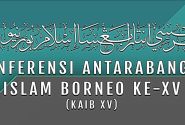
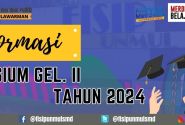
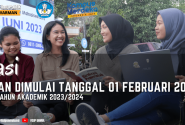
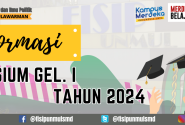
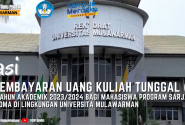
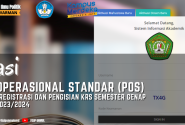
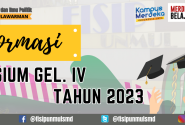
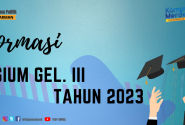
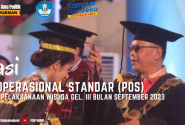


































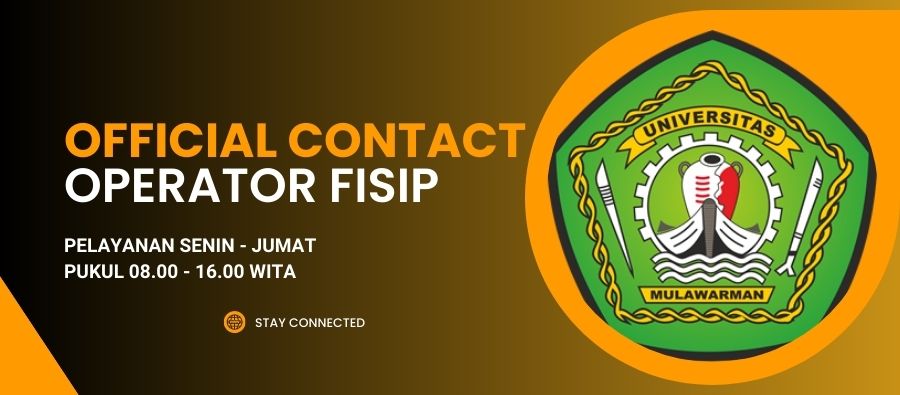
 A. Pendahuluan
Wisuda adalah upacara pengukuhan lulusan dan penyerahan ijazah yang dilaksanakan oleh Rektor, Dekan...
A. Pendahuluan
Wisuda adalah upacara pengukuhan lulusan dan penyerahan ijazah yang dilaksanakan oleh Rektor, Dekan...  Pendaftaran Pelaksanaan Sosialisasi Peningkatan Kompetensi Dosen dan Tendik Tahun 2021 melalui ...
Pendaftaran Pelaksanaan Sosialisasi Peningkatan Kompetensi Dosen dan Tendik Tahun 2021 melalui ...  No.
Nama Perusahaan
Posisi
Link Pendaftaran
1
PT Pelita Samudera Shipping Tbk
Graduate Development Program (GDP)...
No.
Nama Perusahaan
Posisi
Link Pendaftaran
1
PT Pelita Samudera Shipping Tbk
Graduate Development Program (GDP)... 








